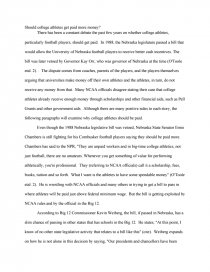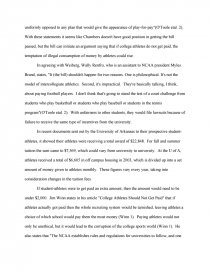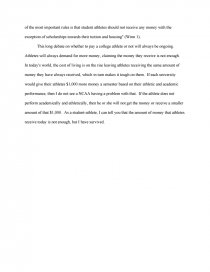Should College Athletes Get Paid More Money?
Essay by review • November 14, 2010 • Essay • 895 Words (4 Pages) • 2,195 Views
Should college athletes get paid more money?
There has been a constant debate the past few years on whether college athletes, particularly football players, should get paid. In 1988, the Nebraska legislature passed a bill that would allow the University of Nebraska football players to receive better cash incentives. The bill was later vetoed by Governor Kay Orr, who was governor of Nebraska at the time (O'Toole etal. 2). . The dispute comes from coaches, parents of the players, and the players themselves arguing that universities make money off their own athletes and the athletes, in turn, do not receive any money from that. Many NCAA officials disagree stating their case that college athletes already receive enough money through scholarships and other financial aids, such as Pell Grants and other government aids. Although there are many positive sides to each story, the following paragraphs will examine why college athletes should be paid.
Even though the 1988 Nebraska legislative bill was vetoed, Nebraska State Senator Ernie Chambers is still fighting for his Cornhusker football players saying they should be paid more. Chambers has said to the NPR, "They are unpaid workers and in big-time college athletics, not just football, there are no amateurs. Whenever you get something of value for performing athletically, you're professional. They (referring to NCAA officials) call it a scholarship, fees, books, tuition and so forth. What I want is the athletes to have some spendable money" (O'Toole etal. 2). He is wrestling with NCAA officials and many others in trying to get a bill to pass in where athletes will be paid just above federal minimum wage. But the bill is getting exploited by NCAA rules and by the official in the Big 12.
According to Big 12 Commissioner Kevin Weiberg, the bill, if passed in Nebraska, has a slim chance of passing in other states that has schools in the Big 12. He states, "At this point, I know of no other state legislative activity that relates to a bill like this" (cite). Weiberg expands on how he is not alone in this decision by saying, "Our presidents and chancellors have been uniformly opposed to any plan that would give the appearance of play-for-pay"(O'Toole etal. 2). With these statements it seems like Chambers doesn't have good position in getting the bill passed, but the bill can initiate an argument saying that if college athletes do not get paid, the temptation of illegal consumption of money by athletes could rise.
In agreeing with Weiberg, Wally Renfro, who is an assistant to NCAA president Myles Brand, states, "It (the bill) shouldn't happen for two reasons. One is philosophical. It's not the model of intercollegiate athletics. Second, it's impractical. They're basically talking, I think, about paying football players. I don't think that's going to stand the test of a court challenge from students who play basketball or students who play baseball or students in the tennis program"(O'Toole etal. 2). With unfairness to other students, they would file lawsuits because of failure
...
...


